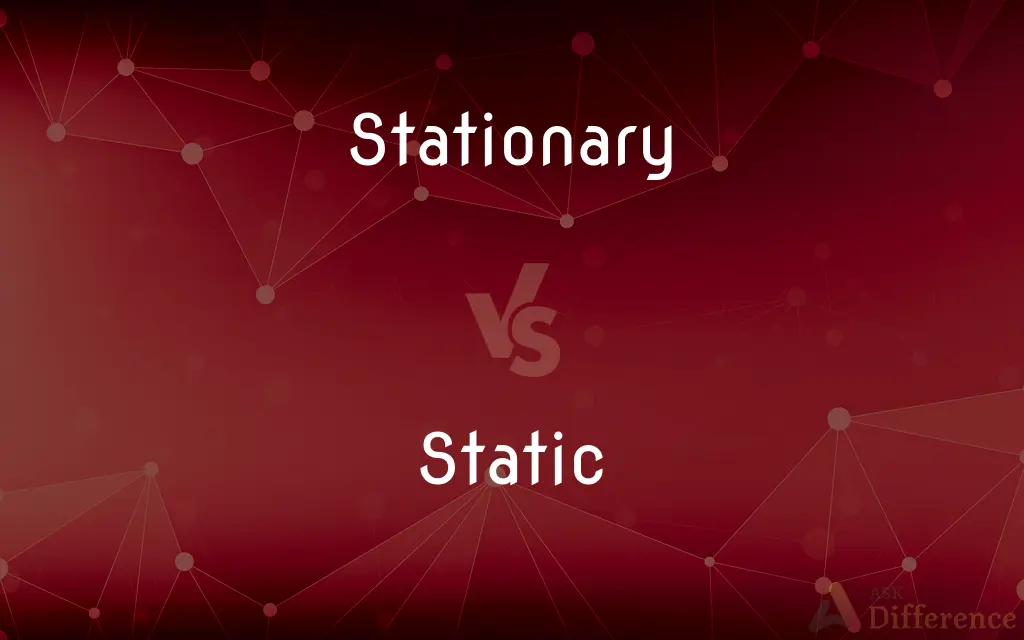Stationary vs. Static — What's the Difference?
By Urooj Arif & Fiza Rafique — Updated on April 15, 2024
Stationary refers to something fixed in one place and not moving, often used in the context of objects, while static describes an unchanging or stable condition, applicable in broader contexts including situations or states.

Difference Between Stationary and Static
Table of Contents
ADVERTISEMENT
Key Differences
Stationary often pertains to physical objects that remain in a fixed position, such as a stationary bicycle. On the other hand, static can refer to situations or environments that are unchanging, like static economic growth.
In physics, stationary describes an object at rest or moving at a constant velocity without acceleration. Conversely, static is used to describe forces in equilibrium or electrical charges that are not in motion.
Stationary is used in everyday language to describe things like furniture or vehicles parked without movement. In contrast, static can also refer to noise or interference in communication, showing its versatility in different fields.
In the context of business or technology, a stationary market might imply no growth or movement in sales, whereas a static website is one that doesn’t change or update dynamically with user interactions.
In educational or office environments, stationary can also mean supplies that are meant to stay in one place, like pens and paper. Meanwhile, static knowledge refers to information that does not change over time, highlighting its application in intellectual contexts.
ADVERTISEMENT
Comparison Chart
Definition
Fixed in one location, not moving
Unchanging, stable in state
Common Usage
Describes physical objects
Broader, includes noise, forces, situations
Examples
Stationary bike, parked car
Static noise, static web page
Fields of Relevance
General use, physics
Physics, IT, communication
Implications
Implies physical immobility
Suggests lack of change or progress
Compare with Definitions
Stationary
Fixed in a particular position.
She kept her gaze stationary on the horizon.
Static
Involving forces that are in balance.
The bridge’s design considered the static forces at play.
Stationary
Not moving from a place.
The guard remained stationary at the door.
Static
Interference or noise in electronic signals.
There was a lot of static on the line during the call.
Stationary
In physics, not changing position relative to a point.
The sculpture is stationary relative to the rotating platform.
Static
Lacking movement, action, or change.
The discussion became static and no new ideas were offered.
Stationary
Pertaining to objects that don’t move.
The car was stationary due to the traffic jam.
Static
Pertaining to or characterized by a fixed or stationary condition.
The software was designed to display static images.
Stationary
Intended for use in a fixed location.
They provided stationary supplies for the office.
Static
Fixed in quantity or structure.
The company's growth has been static for several quarters.
Stationary
Not moving or not intended to be moved
A car collided with a stationary vehicle
Static
Having no motion; being at rest; quiescent.
Stationary
Not moving.
Static
Fixed; stationary.
Stationary
Not capable of being moved; fixed.
Static
(Physics) Of or relating to bodies at rest or forces that balance each other.
Stationary
Unchanging
A stationary sound.
Static
(Electricity) Of, relating to, or producing stationary charges; electrostatic.
Stationary
One that is stationary.
Static
Interference or noise, such as crackling in a receiver, produced when static or atmospheric electricity disturbs signal reception.
Stationary
Not moving.
The train remained stationary for a few moments, before lurching forward along the track.
Static
Back talk.
Stationary
Incapable of being moved
Static
Interference; obstruction.
Stationary
Unchanging
Static
Angry or heated criticism.
Stationary
One who, or that which, is stationary, such as a planet when apparently it has neither progressive nor retrograde motion.
Static
; that cannot or does not change.
Stationary
Misspelling of stationery
Static
Making no progress; stalled, without movement or advancement.
Stationary
Not moving; not appearing to move; stable; fixed.
Charles Wesley, who is a more stationary man, does not believe the story.
Static
; fixed in place; having no motion.
Stationary
Not improving or getting worse; not growing wiser, greater, better, more excellent, or the contrary.
Static
(programming) computed, created, or allocated before the program starts running, as opposed to at runtime.
Stationary
Appearing to be at rest, because moving in the line of vision; not progressive or retrograde, as a planet.
Static
(object-oriented programming) defined for the class itself, as opposed to instances of it; thus shared between all instances and accessible even without an instance.
Stationary
One who, or that which, is stationary, as a planet when apparently it has neither progressive nor retrograde motion.
Static
(uncountable) Interference on a broadcast signal caused by atmospheric disturbances; heard as crackles on radio, or seen as random specks on television.
Stationary
Standing still;
The car remained stationary with the engine running
Static
Interference or obstruction from people.
Stationary
Not capable of being moved;
Stationary machinery
Static
(uncountable) Static electricity.
Static
(countable) A static caravan.
Static
Verbal abuse.
Static
A static variable.
Static
Resting; acting by mere weight without motion; as, statical pressure; static objects.
Static
Pertaining to bodies at rest or in equilibrium.
Static
A crackling or hissing noise cause by electrical interference
Static
Angry criticism;
They will probably give you a lot of static about your editorial
Static
Not active or moving;
A static village community and a completely undynamic type of agriculture
Static feudal societies
Static
Not in physical motion;
The inertia of an object at rest
Static
Concerned with or producing or caused by static electricity;
An electrostatic generator produces high-voltage static electricity
Static
Showing little if any change;
A static population
Common Curiosities
What are examples of static conditions?
Conditions like static noise in communication or static economic conditions where there is no growth.
What does stationary mean in terms of movement?
Stationary means not moving or fixed in one position.
How is static used in physics?
Static can describe forces in equilibrium or stationary charges.
What is a stationary lifestyle?
A lifestyle that involves little to no physical movement, often sedentary.
How does static apply to websites?
A static website displays the same content for all users, without dynamic updates.
Can stationary refer to objects other than physical?
Typically, stationary is used for physical objects, though it can metaphorically describe non-physical entities like time.
Can stationary be used figuratively?
Yes, it can describe something that is unchanging in non-physical terms.
Is stationary used in science?
Yes, especially in physics to describe objects at rest or moving at constant velocity.
What does static mean in audio?
Static refers to persistent background noise or interference in audio signals.
Why is understanding static important in engineering?
It helps in designing structures or systems that can withstand or balance forces.
How does one deal with static electricity?
Using grounding methods or humidifiers can help reduce static electricity.
What does static mean in economic terms?
It refers to an economy that is not experiencing growth or reduction.
How is static different from dynamic?
Static implies no change or movement, whereas dynamic suggests active or constant change.
Share Your Discovery

Previous Comparison
Bronze vs. Brazen
Next Comparison
Smith vs. BlacksmithAuthor Spotlight
Written by
Urooj ArifUrooj is a skilled content writer at Ask Difference, known for her exceptional ability to simplify complex topics into engaging and informative content. With a passion for research and a flair for clear, concise writing, she consistently delivers articles that resonate with our diverse audience.
Co-written by
Fiza RafiqueFiza Rafique is a skilled content writer at AskDifference.com, where she meticulously refines and enhances written pieces. Drawing from her vast editorial expertise, Fiza ensures clarity, accuracy, and precision in every article. Passionate about language, she continually seeks to elevate the quality of content for readers worldwide.
















































